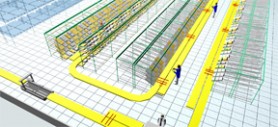SAN JUAN, Puerto Rico (Reuters) — Pharmaceutical giant Pfizer Inc’s decision to eliminate 6,000 jobs at plants in Puerto Rico and elsewhere is a poorly-timed setback for a Caribbean island economy in its fourth year of recession.

The Pfizer restructuring amounts to an 18 percent reduction of its global work force and includes the shuttering of two Puerto Rico plants in Caguas and Carolina as well as the downsizing of a third plant, in Guayana, over the next 30 months.
That translates into the loss of some 1,500 jobs from Pfizer’s 4,000 staff in Puerto Rico, a US commonwealth with a chronic, double-digit unemployment rate that stood at 16.2 percent in March, according to local officials.

“This is an industry trend hitting Puerto Rico,” said economist Vicente Feliciano, president of San Juan-based Advantage Business Consulting. “It’s not a reflection of our competitiveness, but it will hurt.”
Pfizer last year acquired rival drugmaker Wyeth and in November announced the closings of six research sites as part of a cost-cutting and efficiency campaign,
On Tuesday, the company also said it was shutting or reducing operations at plants in Ireland, Germany, Britain and the mainland United States as well as Puerto Rico.
In Puerto Rico, the Pfizer closures reflect a decade-old trend, which had reduced the island’s manufacturing sector from 157,000 jobs to 90,400, according to the Puerto Rico Labor Department.
Initially, the Puerto Rico closures were among labour-intensive manufacturing plants, involving electronic components and clothing manufacturers. But job cuts have come at pharmaceutical plants as patents expired on products and global mergers reshaped the face of Big Pharma.
“The good news is that Pfizer is retaining three plants here, so the private sector and the government need to make sure those plants are as competitive as ever,” said William Reifkohl, executive vice-president of the Puerto Rico Manufacturers Association.
That means lowering power costs and reforming labour laws, manufacturing experts say.
While the island offers manufacturers huge tax breaks, they are most beneficial to large pharmaceutical companies producing patented products. Industry growth in contract manufacturing and generic trend manufacturing has eluded Puerto Rico because of high production costs.
“We need labour reform and lower electricity costs,” Feliciano said.
With an economy in recession since 2006, Puerto Rico’s government last year cut its own work force, launched a campaign to encourage public private partnerships, and pledged to end chronic government overspending by 2013.








